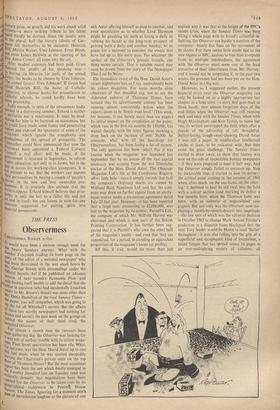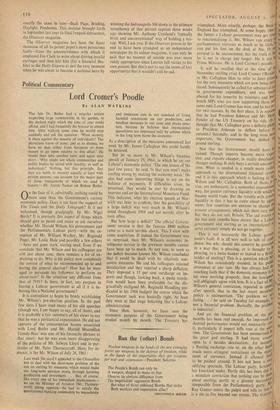THE PRESS
Observermess
CHRISTOPHER BOOKER writes : lT Would have been .a curious enough week for the heavy Sundays anyway. What with the Sunday Telegraph leading its front page on the story of 'the editor of a national newspaper' who '1,(1 been threatened in the wee small hours by ;11.- George Brown with proceedings under the Secrets Act if he published an advance version of next month's Economic Plan—and only finding itself unable to add the detail that the '„ditor in question (who had incidentally knuckled ttVer to Mr. Brown's threat) was none other than thr. Denis Hamilton of the rival Sunday Times— `e Paper, you will remember, which was going to r113 the lid off Whitehall's secrets. But the affairs of these two worthy newspapers had nothing for drama Ilia and secrecy the past week on the goings-on b enind the scenes of their third rival, the wretched Observer. For almost a month now the rumours have been gathering that the Observer was looking for a Way out of seribus trouble with its colour maga- 1iinc. Fleet Street speculation has been rife. What, 14 instance, was the Hon. David Astor up to one 14Y last week, when he was spotted sheepishly leaving the Chairman's private suite on the top i.Or of Thomson House? But the most consistent
has been the one which finally emerged in
Evening Standard late on Tuesday (and was naturally denied); that negotiations have been opened for the Observer to be taken over by its sI nqraPhical stablemate in Printinl House are, The Times. Ignoring for a moment one's .°43t 'Of incredulous• laughter at the picture of one sick Astor offering himself as prop to another, and even speculation as to whether Lord Thomson might be gnashing his teeth at losing a daily or rubbing his hands at the long-term prospect of gaining both a daily and another Sunday, let us pause for a moment to consider the events that have led up to .this sorry pass. For whatever the upshot of the Observer's present travails, one thing seems certain. That a suitable moral may soon be drawn from the story of The Newspaper That Lost Its Nerve.
The immediate cause of the Hon. David Astor's recent nightmares has, as I say, undoubtedly been his colour magazine. For some months close observers of that dreadful rag, not to say the slideruled vultures of Thomson House, have noticed that its advertisement content has been running almost consistently below what the experts deem to be 'break-even level.' (This week, for instance, it ran barely more than six pages.) Its initial impact on the circulation of the paper, which rose in the first six months by 150,000, has waned sharply, with the latest figures showing a drop back on the increase of over 30,000. So someone, what with all the hoardings for Observercolour, has been losing a lot of money. The only question has been—who? For it was known when the magazine was launched last September that by no means all the vast capital necessary was coming from the not illimitable pocket of the Hon. David Astor. The Observer Magazine Ltd.'s file at the Companies Registry offers little help—since it simply records that half the company's Ordinary shares are owned by Midland Bank Nominees Ltd. and that the com- pany may draw on further capital from an anony- mous source under a mysterious agreement dated July 23 last year. However--it has been reported that a large sum, amounting to £2,000,000, was lent to the magazine by its printer, Purnell's Ltd., the company of which Mr. Wilfred Harvey was chairman and which is now part of the British Printing Corporation. It has further been sug- gested that it is Purnell's who own the other half of the magazine's equity—and even that they are committed, for a period, to standing an equivalent proportion of the magazine's losses (or profits).
All this, if true, would do more than just
explain why it was that at the height of the BPC's recent crisis, when the Sunday Times was busy filling a whole page with its board's colourful in- fighting, the Observer ran hardly a mention of the company—barely five lines on the movement of its shares. For there seems little doubt that to the new regime at BPC, zealous to free their company from its multiple indebtedness, the agreement with the Observer must seem one of the least attractive of their inheritances from Mr. Harvey; and it would not be surprising if, in the past two weeks, the pressure had not been put on the Hon. David Astor in a big way.
However, as I suggested earlier, the present financial crisis over the Observer magazine can only be looked on as a highly appropriate last chapter in a long story—a story that goes back to those heady, now almost forgotten days of the mid-'fifties when the Observer was still running neck and neck with the Sunday Times, when with Hugh Massingham and Ken Tynan, to name but two, its writers outstripped the field, when after a decade of the editorship of tall, thoughtful, Balliol-loving, cough-sweet-chewing David Astor it was still a paper, in middle-class intellectual circles at least, to be reckoned with. But then came the great challenge. The Sunday Times started to draw away, to show that history was now on the side of respectable Sunday newpapers —if they were prepared to meet it half way. And the Observer simply failed to measure up. Step by inexorable step, it started to lose its nerve— the critical point coming in the autumn of 1961 when, after much 'on the one hand, on the other- ing,' it declined to beat its old rival into the field with a colour section (and marking its defeat a few months later, when the Thomson baby was born, with 'an editorial of unparalleled sour grapes). But not• only was the Observer now dis- playing a month-by-month descent into ineptitude —the low spot of which was the editorial decision in October 1963 to change Mark Arnold Forster's prediction in a dispatch from Blackpool that the next Tory leader would be Home to read 'Butler' throughout—it was also falling into the grip of a superficial and sycophantic kind of journalism, a bland fungus that has spread across its pages in an ever-multiplying variety of columns, all exactly the same in tone—Back Page, Briefing, Daylight, Pendennis. This malaise brought forth in September last year its final fungoid dehiscence, the Observer magazine.
The Observer magazine has been the finest showcase of all its parent paper's most pernicious faults—from the amateurishness with which it employed Jim Clark to write about driving invalid carriages and then lost him (for a financial flea- bite) to the Daily Express at just the very moment when he was about to become a national hero by winning the Indianapolis 500 down to the ultimate sycophancy of that picture caption three weeks ago showing Mr. Anthony Crosland's `typically brisk and unconventional' way of holding a tea- cup. Well, I ask you. If the Observer proves in the end to have been strangled as an independent newspaper by its colour magazine, it can only be said that no manner of suicide was ever more richly appropriate since Laertes fell victim to his own poison. But that's not to say (in terms of lost opportunity) that it wouldn't still be sad.































 Previous page
Previous page